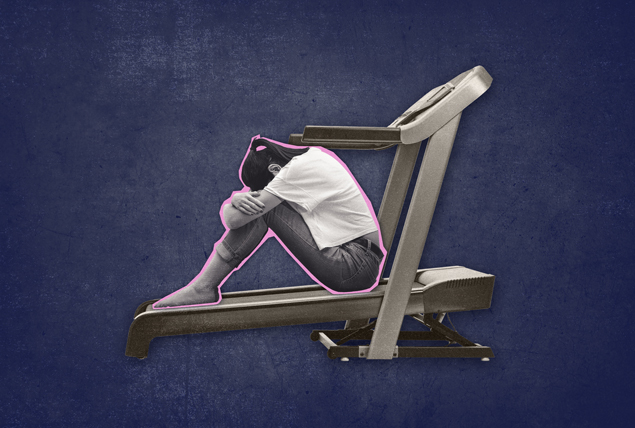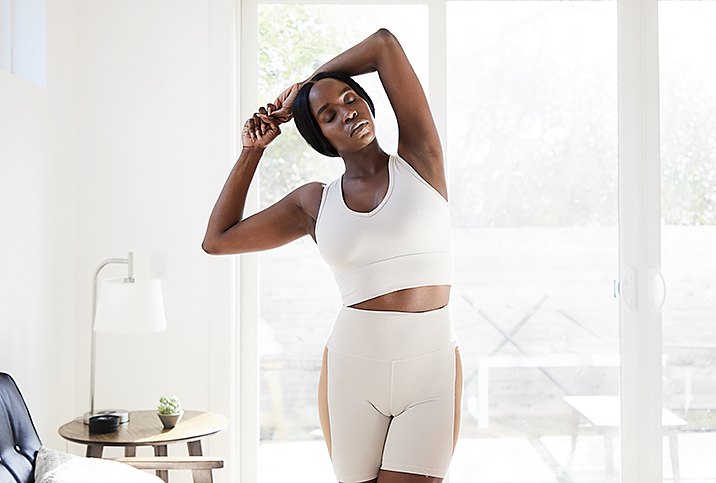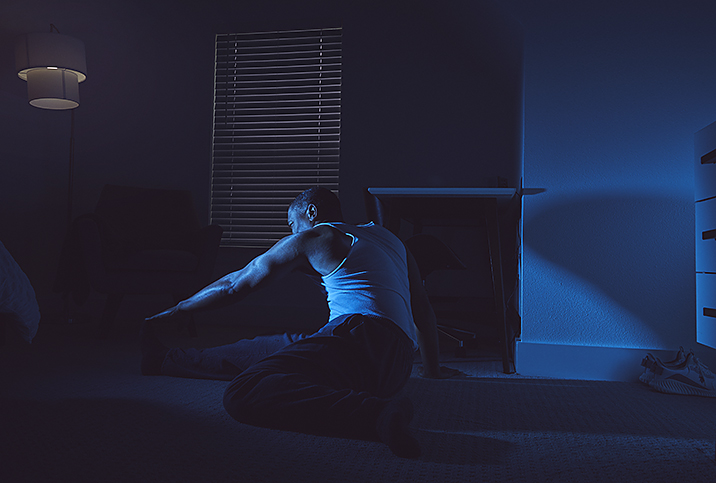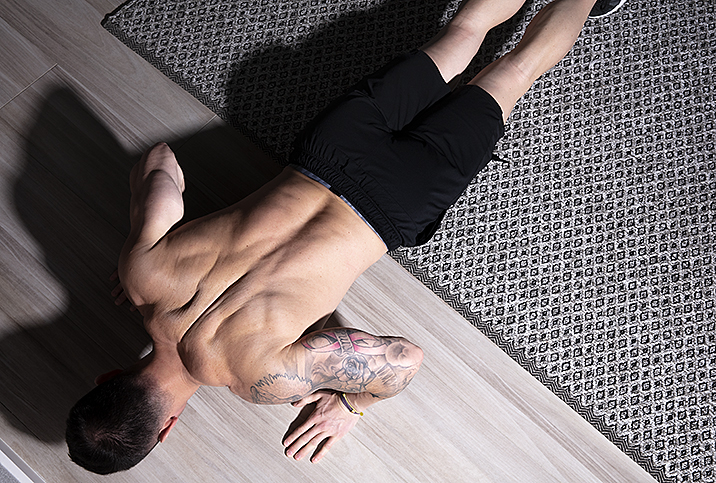How Can You Help Yourself Exercise When Depressed?

Key Points
- Many things can seem difficult, or even impossible, to do when you're depressed.
- As hard as it may seem in the moment, there are ways to help find the motivation to exercise when you're stuck with the symptoms of depression.
- Any kind of workout—even a short walk—can help you start to feel better.
Low motivation and minimal energy are two of the fundamental symptoms of depression. How do you get moving and active when you barely want to leave the sofa?
Let's see what the experts say about how to find the will to move your body (and why it's a good idea).
Why is it important to exercise while you're depressed?
Exercise means more than fitting into a cute outfit. Exercise improves your sex life, brain health, energy and mood. These are whole-body benefits—and especially useful for someone experiencing depression.
Physical benefits
Depression can leave you in a slump and zapped of energy. It might seem counterintuitive to exercise when you have no energy, but doing so can produce more mitochondria inside your muscle cells, increasing your energy supply, according to Harvard Health Publishing.
Exercising when depressed can help you focus on something outside yourself. Depression affects libido, but exercise could help you feel like something closer to yourself. When you complete a challenging workout or a hard run, that feeling of accomplishment can have lasting effects.
The benefits of exercise in body and mind are largely due to changes in the brain.
"Researchers believe that the decrease in symptoms is likely caused by an increase in circulation to the brain and changes in the hypothalamic-pituitary-adrenal (HPA) axis, which in tandem reduces stress and increases energy," said Philip Hemphill, Ph.D., L.C.S.W., the chief clinical officer at All Points North with locations in Colorado, Dallas, London and Malibu, California.
Exercise can be effective in helping to treat depression because it causes positive chemical changes in the brain.
"Exercise increases norepinephrine, dopamine and serotonin, the very same chemicals that are increased with ADHD medication, which improves concentration," Hemphill said.
Mental health benefits
A majority of mental health outpatient respondents reported a link between exercise and mood or anxiety levels in a 2017 study.
"Regular exercise helps one form a routine, ensures a period of distraction from negative self-thoughts, provides a sense of accomplishment and satisfaction, and is an opportunity for social interaction—all positives that can contribute to increased feelings of wellness," Hemphill said.
Why is it so difficult to exercise when you're depressed?
Depression can suck the motivation right out of you. This common mental health condition can make you feel alone, but you have plenty of company. Roughly 29 percent of adults are diagnosed with depression in their lifetime, and 17.8 percent of adults are currently struggling with depression, according to a 2023 Gallup report.
Knowing all of the ways exercise can help you feel better, what makes it so difficult to get moving?
Low dopamine
Exercise helps change brain chemicals likely implicated in depression, including serotonin, dopamine and norepinephrine. Exercise does a bit of housekeeping, adding to higher levels of dopamine and more dopamine receptors so you can feel better and experience joy, according to the University of California, Berkeley's Greater Good Magazine.
"On a neurochemical level, exercise decreases adrenaline and cortisol, two powerful hormones that create stress in the body," Hemphill said. "Endorphins, the mood-elevating chemicals that contribute to a runner's high, are what boost positive feelings post-workout. These strong neurochemical interactions are proven to elevate mood and decrease stress."
Social anxiety
Isolation is a common byproduct of depression. Being seen in a gym might feel distressing for someone with depressive symptoms. Mustering the energy to be in public, even if it's walking around your block, can be difficult for someone who is feeling low. Social anxiety and depression typically run hand in hand.
Lack of support
Beginning anything new can seem intimidating and overwhelming. Add depression to the mix, and the idea of going out and exercising, especially for someone who hasn't done much in the way of physical activity before, can prove paralyzing.
Going it alone can feel like too much.
Unsure of how to begin
Overthinking an exercise plan can turn a molehill into a mountain. People with depression or those new to working out may think they need to do certain forms of exercise—spending an hour on an elliptical machine, for example—for it to count.
Gyms can be intimidating for people who don't frequent them. Rest assured, there are plenty of ways to find joyful movement that don't include setting foot in a gym. The benefits of exercise are worth it.
Recommended
- 6 Ways Exercise Can Improve Your Sex Life: Liven up your workouts, and you can liven up the bedroom as well.
- How Exercise Improves Men's Sexual Health: Being active is good for everyone, but there are benefits specific to males.
- Science Explains Why Working Out Gets You So Worked Up: Exercise can make you horny—mostly due to exercise-induced hormones.
How can you get motivated to work out when you don't feel like it?
Living with depression isn't easy, but it is possible to shrug off your low motivation to work out. Get creative and follow a few tips.
Set realistic goals
"When you feel like crap, it's hard enough to get out of bed, so start as small as you can," said Leah Riddell, L.C.M.H.C. a licensed clinical mental health counselor with Greenville, North Carolina-based Origins Counseling and Wellness.
Capitalize on any burst of energy, no matter how small.
"Walking to the shower, to the mailbox or to the nearest stop sign can be a win. Once you've got that movement, work up to something more fun—walk, dance, skip, bike, skateboard, rollerskate, hoverboard—something that will give you a hit of dopamine," Riddell said.
All forms of exercise—aerobic exercises such as running and swimming or anaerobic ones such as interval training—can be beneficial. What's essential is to start with something achievable and enjoyable (or that would be without depression).
"It doesn't have to be 'go to the gym or you're a failure,' though that is what our brains like to tell us sometimes," Riddell said.
Find a workout buddy
Working out with company isn't for everyone, but doing so can be a helpful motivator to stick to an actionable exercise routine. A once-a-week morning walk might be difficult to skip if someone else is going with you.
Is there someone at work interested in a lunchtime stroll or an after-work walk? Are there parents you talk with in the school pickup line who you can reach out to? Start small and scale up from there.
Consider a group class or meetup
A common barrier to exercise for people is that working out is perceived as a chore. While pumping a set of dumbbells can be enjoyable for some people, it can feel monotonous, overly competitive or not the right exercise program for another.
Physical activity has many forms, and it can be helpful to try something new, like a group class. Community is a huge part of our humanity, Riddell said.
You can define what exercise looks like to you. It doesn't have to take place at the gym to help boost your mood and help relieve your depressive symptoms.
"Exercise can be sexual activity. Exercise can be running in the park. Exercise can be swimming with your grandkids or volunteering at your local bird sanctuary," Riddell said. "You get to define what that looks like in your life."
Prep in advance
Prepping in advance for exercise can help people stick to their exercise goals and help boost a low mood. Examples include holding yourself accountable to a dance meetup you signed up for or telling yourself that at 5 p.m. you'll take a 30-minute walk with your dog.
How do you know if exercise is working for you?
If you're using exercise as part of your holistic toolkit for mental health, check for signs that it's working.
"If you're finding yourself with more energy, more hope for the future, more enjoyment in life and the present moment, that's a pretty good sign," Riddell said.
If you start a new workout program, noticing moments of increased focus or better sleep can be telling signs that your routine is helping, said Brent Nelson, M.D., an adult interventional psychiatrist and the chief medical information officer at PrairieCare in Edina, Minnesota. "Exercise's effects might take time to show, and its effectiveness can vary from person to person."
When should you seek out further care for your depression?
Regular daily exercise can help boost your mood, but it's not a cure-all or a replacement for other treatments, such as therapy or medication.
If you're feeling blue after exercise, additional treatment may be needed. A therapist or general provider can help you determine which types of treatment may be most useful, in addition to movement.
"If depression symptoms are significantly interfering with daily life, persist for more than a few weeks, or involve thoughts of self-harm or suicide, it's essential to seek professional help immediately," Nelson said.
The bottom line
Exercise isn't a perfect solution to mental health complications, but research suggests it can help alleviate the physical and emotional symptoms of depression.
If you're struggling to get moving when you're depressed, a small and actionable movement, like a short walk around the block, can help you get started.


















